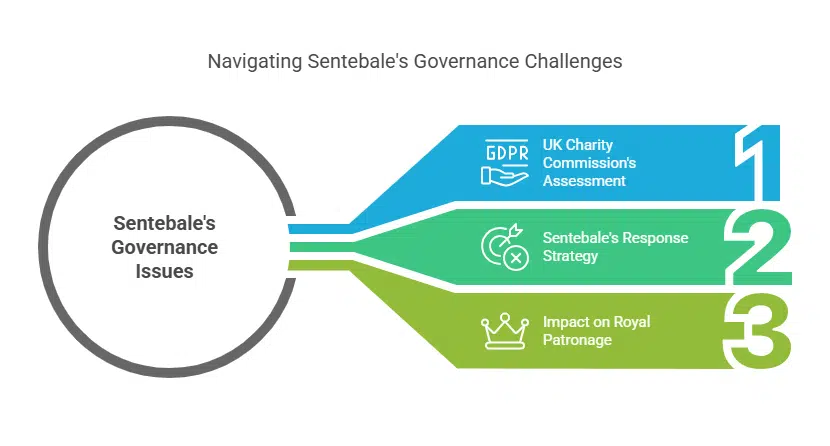Britain’s Prince Harry has officially stepped down as patron of Sentebale, the charitable organization he co-founded in 2006 with Prince Seeiso of Lesotho. The announcement has come as a shock not only to supporters of the charity but also to Harry himself, who described his resignation as being made with “heavy hearts.” The prince, who co-founded Sentebale in honor of his late mother Princess Diana, cited internal governance disputes as the reason for his departure.
Sentebale, which translates to “forget-me-not” in Sesotho, the local language of Lesotho, was established to support children and young people affected by HIV and AIDS in Lesotho and Botswana. The organization has been one of Harry’s most emotionally connected initiatives, inspired by his first visit to Lesotho during his gap year in 2004. His experiences there deeply moved him, particularly the widespread impact of HIV/AIDS on vulnerable youth.
The Founding Vision and Legacy
Harry and Prince Seeiso created Sentebale as a tribute to their mothers—Princess Diana and Queen Mamohato Bereng Seeiso—who were both deeply involved in humanitarian efforts. Over the years, Sentebale has provided critical support in the form of healthcare, education, and psychological services to young people. Harry frequently visited southern Africa and maintained a hands-on role in its programming and fundraising. His last visit to Lesotho was in October 2023, when he participated in a fireside conversation to hear directly from local beneficiaries about the charity’s impact.
The charity’s mission and programs had earned global recognition for empowering young people through community-led programs. Sentebale operated youth clubs, educational workshops, and mental health support initiatives aimed at destigmatizing HIV while promoting youth leadership and social resilience.
Internal Crisis and Leadership Rift
The current controversy within Sentebale stems from a dispute between the charity’s trustees and its Chair of the Board, Dr. Sophie Chandauka. According to a joint statement released by Prince Harry and Prince Seeiso, the trustees had acted in the best interest of the charity when they requested Dr. Chandauka step down. Following her refusal and subsequent legal action, both co-founders and the board of trustees chose to resign from their roles “until further notice.”
Though the precise reasons for the dispute remain unclear, reports suggest that tensions have been building for months. Vanity Fair reported that concerns among trustees centered around Chandauka’s leadership style and decisions, including a proposed relocation of the charity’s fundraising base from the UK to Africa. Sources indicated that these changes were viewed by some as financially and operationally risky.
Dr. Chandauka responded with a sharply worded public statement, rejecting the accusations and framing the situation as an attempt to silence her for calling out poor governance and misconduct. She said, “There are people in this world who behave as though they are above the law and mistreat people, and then play the victim card.” Her comments appeared to be directed at Prince Harry without naming him directly.
She added that her efforts at Sentebale had been guided by principles of fairness and equality, regardless of a person’s status or wealth. She accused unnamed individuals within the organization of bullying, harassment, abuse of power, and misogynoir—a term that refers specifically to the discrimination faced by Black women.
Dr. Chandauka also claimed that she had reported the trustees to the UK Charity Commission and that a UK High Court injunction had been issued preventing her dismissal. However, CNN reported that it could not verify the existence of such an injunction. A source familiar with the legal matter stated no such court order had been issued.
Legal and Regulatory Repercussions
The UK’s Charity Commission confirmed that it was aware of concerns about the governance of Sentebale and that it is currently assessing the matter to determine what regulatory action, if any, may be appropriate. The organization did not provide additional details but confirmed it was monitoring the situation closely.
Meanwhile, a spokesperson for Sentebale attempted to downplay the severity of the resignations, characterizing the current changes as a “recalibration of the board” and framing them as part of a broader transformation strategy. They emphasized the charity’s ongoing commitment to its mission and stated that it had not received formal resignations from all royal patrons at the time of their statement.
Sentebale’s Future Uncertain
Prince Harry’s departure is a significant loss for Sentebale, given his global visibility and deep personal investment in the cause. For nearly two decades, he served not just as a figurehead, but as an active ambassador and donor, leveraging his royal platform to raise awareness and support.
The departure of both co-founders and trustees raises questions about the future leadership and direction of Sentebale. With the Charity Commission now involved and legal claims being publicly aired, the organization is entering a turbulent phase. If unresolved, these issues could undermine years of trust built with local communities and international donors.
Despite stepping down, both Harry and Prince Seeiso affirmed their enduring connection to the organization, stating, “Although we may no longer be patrons, we will always be its founders, and we will never forget what this charity is capable of achieving when it is in the right care.”
A Personal Blow to Prince Harry
The resignation marks another chapter in Prince Harry’s increasingly independent yet complex public life. After stepping back from official royal duties in 2020, Harry had continued to champion a handful of philanthropic causes, including Sentebale, the Invictus Games, and mental health advocacy.
For Harry, who has often spoken of how much Africa feels like a second home, the situation at Sentebale represents not just a professional setback but a deeply personal disappointment. His mother, Princess Diana, was a global figure in AIDS activism, and his commitment to continuing her legacy through Sentebale has long been central to his identity.
Observers note that the charity’s challenges reflect broader themes in Harry’s public narrative—conflict with institutional structures, a desire for reform, and a commitment to social justice. Whether or not he returns to Sentebale in the future remains uncertain, but his emotional ties to the region and the cause are unlikely to fade.
A Turning Point for Sentebale and Harry
Sentebale now faces a period of intense scrutiny and internal change. Its mission remains vital, especially in a region still battling high rates of HIV/AIDS among youth. For the charity to thrive, it will need to resolve its governance crisis swiftly and transparently, rebuild trust, and re-establish a stable leadership structure.
As for Prince Harry, this departure underscores the complex realities of modern philanthropy—where passion, politics, and power often collide. Whether this marks the end of his direct involvement with Sentebale or a temporary break remains to be seen. What is clear is that his commitment to the youth of southern Africa endures, even as his formal role comes to an unexpected halt.





































